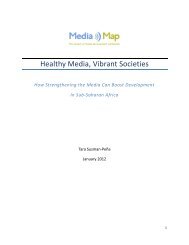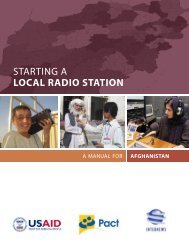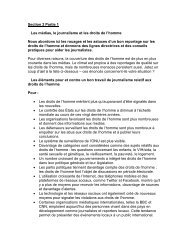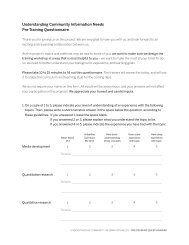- Page 1 and 2: 1HAITIMedia and Telecoms Landscape
- Page 4: 4Source: Nations Online ProjectAdmi
- Page 7: 7Some 536,000 cases of cholera were
- Page 12 and 13: 12This time, Aristide accused the U
- Page 14 and 15: 14The decline of agricultureA serie
- Page 17 and 18: 17Schools began to teach Creole in
- Page 19 and 20: 19Few Haitians can afford to buy a
- Page 21 and 22: 21Many Haitians listen to the radio
- Page 23 and 24: 23Télé Caraïbes is the most popu
- Page 25: 25Press freedom and media regulatio
- Page 29 and 30: 29Media groupsMany of the most popu
- Page 31 and 32: 31Radio Télé Ginen www.rtghaiti.c
- Page 34 and 35: 34They also broadcast online.TNH cl
- Page 36 and 37: 36These rebroadcast networked progr
- Page 38 and 39: 38Radio Lumière was originally est
- Page 40 and 41: 40The newspaper is published in Mia
- Page 42 and 43: 42According to Internews, 56 radio
- Page 44 and 45: 44All showed similar trends of medi
- Page 46 and 47: 46Radio Ginen (92.9 FM), which has
- Page 48 and 49: 48Very little survey work has been
- Page 50 and 51: 50International radio stationsInter
- Page 52 and 53: 52About 95% of Caraïbes FM’s bro
- Page 54 and 55: 54Radio Ginen employs 20 journalist
- Page 56 and 57: 56Director General Radio Lumière -
- Page 58 and 59: 58Richard Widmaier said that more r
- Page 60 and 61: 60Multipresse, the parent company o
- Page 62 and 63: 62Radio Nationale d’Haïti (RNH)
- Page 64 and 65: 64Minustah FM relay stationsSource:
- Page 66 and 67: 66Many Haitians regard Minustah FM
- Page 68 and 69: 68Cap-Haïtien - Radio Voix Ave Mar
- Page 70 and 71: OwnershipFrequencyCommuneDepartment
- Page 72 and 73: 72jacquessampeur@yahoo.comWest Port
- Page 74 and 75: 74+509 3734-2254 Star chancyalbert@
- Page 76 and 77:
76West Léogane Radio ProschFM99.9
- Page 78 and 79:
78Artibonite Gonaïves Roody Phanor
- Page 80 and 81:
80Arbibonite Saint-Marc Orius Fritz
- Page 82 and 83:
82Grand’AnseJérémieGrand’Anse
- Page 84 and 85:
84North Cap-Haïtien Radio PassionH
- Page 86 and 87:
86North-West Port-de-Paix Louis Ale
- Page 88 and 89:
88South Les Cayes Cayes Bishopric R
- Page 90 and 91:
90South-East Jacmel Diocèse deJacm
- Page 92 and 93:
92South Les Cayes MUPAC(MouvementUn
- Page 94 and 95:
94List of top 30 radio stations in
- Page 96 and 97:
96Television overviewOnly a third o
- Page 98 and 99:
98Télévision Nationale d’Haïti
- Page 100 and 101:
100The DAGMAR survey showed that te
- Page 102 and 103:
102Télé Ginen www.rtg.haiti.comIn
- Page 104 and 105:
104During the run-up to the 2010 el
- Page 106 and 107:
106Télé Métropole shares a team
- Page 108 and 109:
108NU TV www.nu-tv.comNU TV offers
- Page 110 and 111:
ChannelNameOwnerCommuneDepartment(P
- Page 112 and 113:
112WestWestWestWestWestPort-au-Prin
- Page 114 and 115:
114North Cap-Haïtien Patrick Charl
- Page 116 and 117:
116Print overviewHaitian newspapers
- Page 118 and 119:
118They include:Haïti en Marche ww
- Page 120 and 121:
120Information from these four agen
- Page 122 and 123:
122Switchboard : +509 2816 0224+509
- Page 124 and 125:
124List of News AgenciesNews agency
- Page 126 and 127:
126The DAGMAR survey showed that on
- Page 128 and 129:
128President Michel Joseph Martelly
- Page 130 and 131:
130The IFRC used the TERA system to
- Page 132 and 133:
132Media resourcesMedia and telecom
- Page 134 and 135:
134Media associationsAssociation de
- Page 136 and 137:
136Its members include:Mélodie FM
- Page 138 and 139:
138List of regional and thematic jo
- Page 140 and 141:
140Réseau des Femmes desRadios Com
- Page 142 and 143:
142Following the January 2010 earth
- Page 144 and 145:
144Haiti contact - Rommel PierreMob
- Page 146 and 147:
146In early 2012, it sponsored a se
- Page 148 and 149:
148President - René DurocherMob: +
- Page 150 and 151:
150Co-Owner - Rachèle MagloireMob:
- Page 152 and 153:
152Advertising, media marketing and
- Page 154 and 155:
154Email: benjamin@lesproductionsso
- Page 156 and 157:
156Rafaelle CasteraPhotographer.Mob
- Page 158 and 159:
158PrintersLe Nouvelliste www.lenou
- Page 160 and 161:
160Telecommunications overviewNearl
- Page 162 and 163:
162However, Haitel went into receiv
- Page 164 and 165:
164Impact of the 2010 earthquakeThe
- Page 166 and 167:
166Voilà allowed IFRC to use its s
- Page 168 and 169:
168Source: Digicel Haiti websiteDig
- Page 170 and 171:
170Deputy Director - Tran Sy TienTe
- Page 172 and 173:
172http://www.iadb.org/en/news/webs
- Page 174 and 175:
174Technical specifications: Popula
















